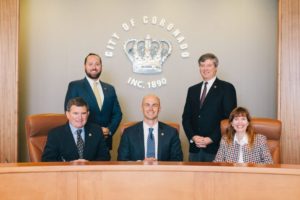
Efforts to make life more livable for residents and pedestrians on Third and Fourth Streets (State Route 282) are moving forward, albeit slowly. “It’s a tough slog,” City Manager Blair King told the city council at its May 16 meeting. King has made it a practice to keep the council regularly apprised of progress on a number of traffic calming strategies the city has initiated; these include, bulb-outs on A, C and Pomona Avenues, yield to pedestrian signs at F Avenue, and a traffic signal at Fourth and Alameda.
All changes require the California Department of Transportation’s (Caltrans) approval. For years the department has frustrated the city’s attempts to slow traffic and create some semblance of a neighborhood atmosphere. The city had some success with getting approval for bulb outs. Some have been installed in the corridor. Critics have complained they were too narrow to effectively calm traffic. This time the city sought wider ones.
At first Caltrans had seemed amenable. But King learned ahead of Tuesday’s city council meeting that the department “has had second thoughts.” The radius of the turns would be too wide for large trucks to navigate. “If that were true, we would never have groceries in Vons,” Councilman Bill Sandke said, noting that Vons’ drivers have no trouble navigating a 12-wheeler into the alley between Orange and D Avenue to reach the store’s delivery dock.
There has been a measure of success with the other projects.
Plans for a traffic signal on Fourth and Alameda are moving forward and construction could began this fall.
Caltrans may also make the in street pedestrian signs permanent as a pilot project. The signs were put in place to assist school crossing guards and appear to have made a difference. “The signs slow traffic even when guards are not on duty,” King noted.
There was a bit of a dustup over spending an additional $280,000 on the John D. Spreckels Center and Bowling Green. The vote was 4-1. Councilwoman Carry Downey voted no. She objected to the source of the funding, not the funding itself. Downey wanted the money to come out of the city’s general fund. Councilman Mike Donovan wanted to use the Frances Harpst endowment. There is $1 million in unrestricted funds left.
When the council approved the center as a capital improvement project (CIP), it specified that the bulk of the cost come from funds the late philanthropist left the city. The Spreckels Center costs $6.5 million, $4.5 came from the Harpst fund, $1.3 from the general fund, and $725,000 from the CIP fund.
Downey wanted what remained to be kept for another worthwhile project to honor the philanthropist. Donovan justified using the Harpst money because of her efforts on behalf of seniors. Others on the dais supported this idea.
“[Harpst] had a soft spot in her hear for Meals on Wheels,” King said. The organization primarily, though not exclusively, serves housebound seniors. It wasn’t her only cause. PAWS, Sacred Heart Church, Coronado Schools Foundation, University of San Diego all received bequests from her estate.
Downey was on the council at the time the Spreckels Center project was approved and did support taking $4.5 million from the fund. “I was one of the original advocates,” she said.
She opposed raiding the fund now, because she didn’t want to see the city drain the endowment on small bore costs, especially when the general fund is flush. At last month’s budget workshop, King told the council at the end of the fiscal year there would be over $400,000 left in the general fund. “At the end of the year, we’re going to have to spend that money on something,” Downey said in a phone interview following the meeting.
Other major council action included:
Voted to support the San Diego Unified Port District’s Master Plan to designate part of Grand Caribe Isle as recreation/open space. “This is important, because it stops development,” said Phil Monroe, former councilman and Cays resident. “Since 1994 we’ve been fighting six hotel proposals on that property. If port commissioners include the designation in the master plan, no hotel or other commercial structure will be built.”
Supported reducing fines for bicycle violations. By changing its ordinance, the council hopes to increase enforcement as a way to improve bicycle safety. “We’re not making money on tickets. For example, on a $50 fine the city only makes $3.75,” Donovan pointed out.
Approved a historic alteration permit for a Requa house at 1127 F Avenue. The remodel and additions to the back of the house, though extensive, all complied with the city’s rules for historic restoration.




